15 Best AI Tools for Healthcare Proposals

Why do healthcare vendors spend weeks on proposals, yet still watch opportunities slip away?
In healthcare RFPs, the number of security-related questions has surged, often exceeding 150 per proposal. Experts caution that these large questionnaires do not just test compliance; they also exhaust vendor teams, leading to rushed and less accurate responses. For proposal managers and sales leaders, this translates into wasted time, stressed teams, and deals lost to competitors who submit sharper, more compliant answers.
How often has your team struggled to piece together responses from scattered spreadsheets, outdated documents, and siloed email threads, only to find that deadlines are still missed? The reality is that healthcare proposals demand more precision than most industries, yet the manual process makes consistency nearly impossible.
This is where the best healthcare proposal content AI can transform the process, helping teams simplify compliance-heavy requests, centralize knowledge, and generate structured drafts in minutes.
This blog will explore why healthcare proposals are so complex, how AI tools address these challenges, and which top solutions stand out for healthcare teams.
Key Takeaways:
- Healthcare proposals are uniquely complex because of strict compliance requirements, extensive questionnaires, and multi-department involvement, making manual approaches inefficient.
- AI tools bring value by centralising proposal content, auto-generating accurate first drafts, and enabling better collaboration across sales, compliance, and technical teams.
- Choosing the right AI platform requires evaluating integration with existing systems, ease of use for cross-functional teams, and scalability for growing proposal volumes.
- Inventive AI stands apart with healthcare-focused features like Win Themes and AI Content Manager, designed to address industry-specific compliance and consistency gaps.
- The future of healthcare proposals will be defined by AI-driven automation, helping teams deliver faster, consistent, and client-ready submissions under tighter deadlines.
Complexity in Healthcare Proposals and How AI Solves It
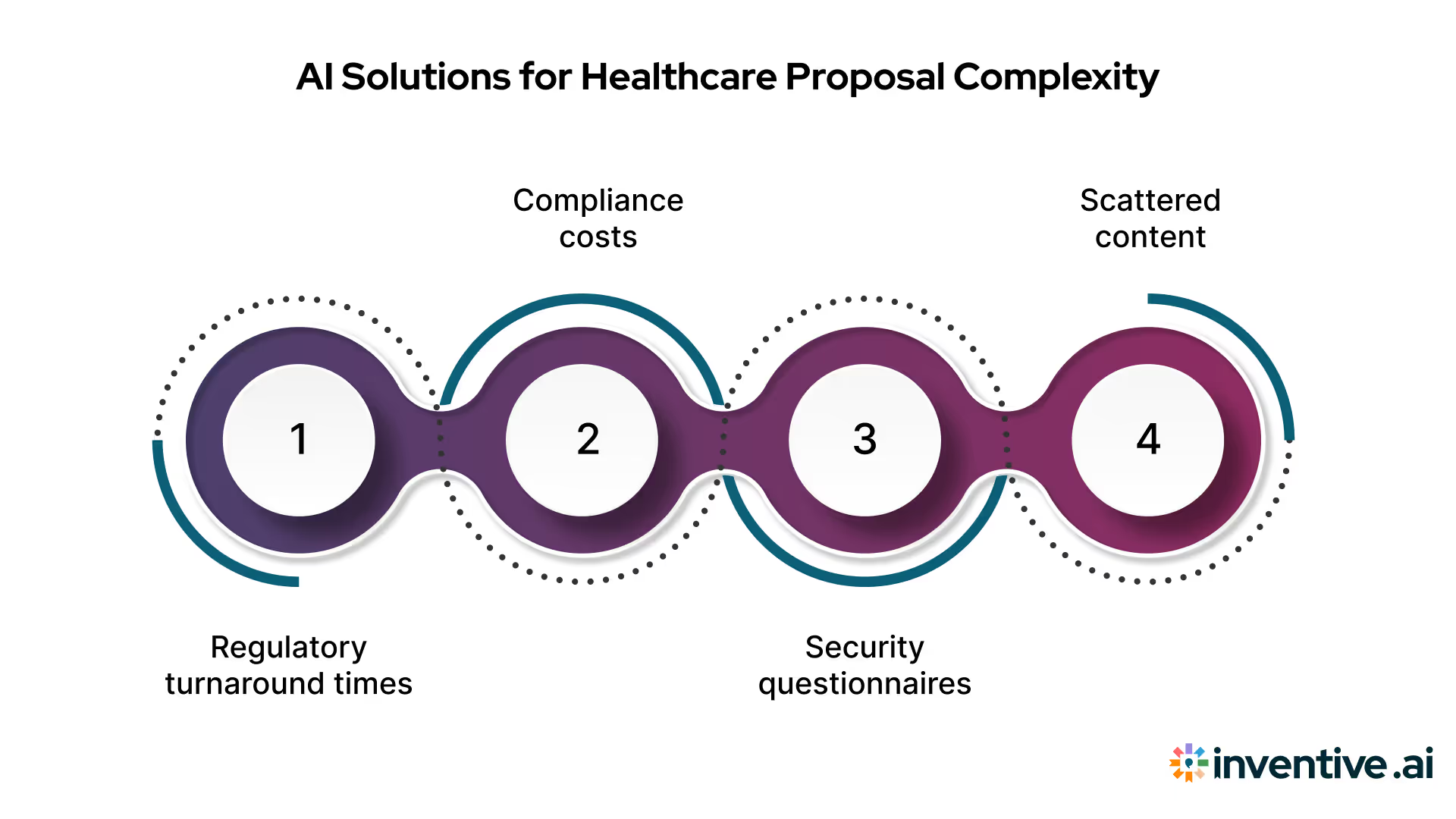
Healthcare proposals are more complex than most industries because they combine strict regulatory requirements, security audits, and compliance-heavy documentation. Manual processes make these challenges worse.
Key factors that increase complexity include:
- Regulatory turnaround times: Starting in 2026, CMS mandates urgent prior authorization requests be completed within 72 hours and non-urgent within seven days. This is faster than before, yet still reflects the lengthy decision cycles common in healthcare.
- Compliance costs: A 161-bed community hospital spends around 7.6 million dollars annually on compliance, supported by 59 full-time equivalent staff. Across the sector, compliance costs reach 39 billion dollars, equal to 1,200 dollars per patient admission.
- Security questionnaires: Many healthcare RFPs contain more than 150 security-related questions. These exhaust vendor teams, leading to rushed or inaccurate answers.
- Scattered content: Teams often rely on siloed spreadsheets, emails, and old documents, wasting valuable time searching for accurate information.
For CROs and VPs of Sales, these factors reduce revenue velocity and strain sales cycles. For proposal managers, they mean greater risk of missed deadlines and inconsistent responses.
This is why the best healthcare proposal content AI has become essential:
- Centralises knowledge sources to eliminate content silos
- Generates accurate first drafts quickly, reducing manual drafting time
- Flags outdated or conflicting content, ensuring proposals align with compliance expectations
- Improves collaboration across sales, compliance, and solutions teams
Also Read: Guide to RFP Automation in Healthcare with AI
AI-driven proposal management is no longer optional. It is the only practical way to meet regulatory timelines, control compliance costs, and deliver consistent, high-quality responses. But which AI tools actually deliver on this promise?
Ranking Top 15 AI Tools for Healthcare Proposal
Choosing the top healthcare proposal AI tools is no longer optional for vendors competing in compliance-heavy healthcare markets. A recent Loopio survey revealed that proposal professionals spend an average of 32 hours writing a single RFP response.
A Salesforce partner study further found that teams dedicate about 33 percent of their time preparing proposals, pitches, and presentations during the sales cycle. For many US organizations, this translates into more than 40 hours per week spent solely on proposal work. This immense time burden highlights why AI tools are becoming essential to reduce manual effort, improve accuracy, and help sales and proposal teams focus on winning deals.
To help you choose the right fit, here’s a comparison of the top 15 AI tools shaping healthcare proposal management today:
Let's take a closer look at each solution in detail:
1. Inventive AI
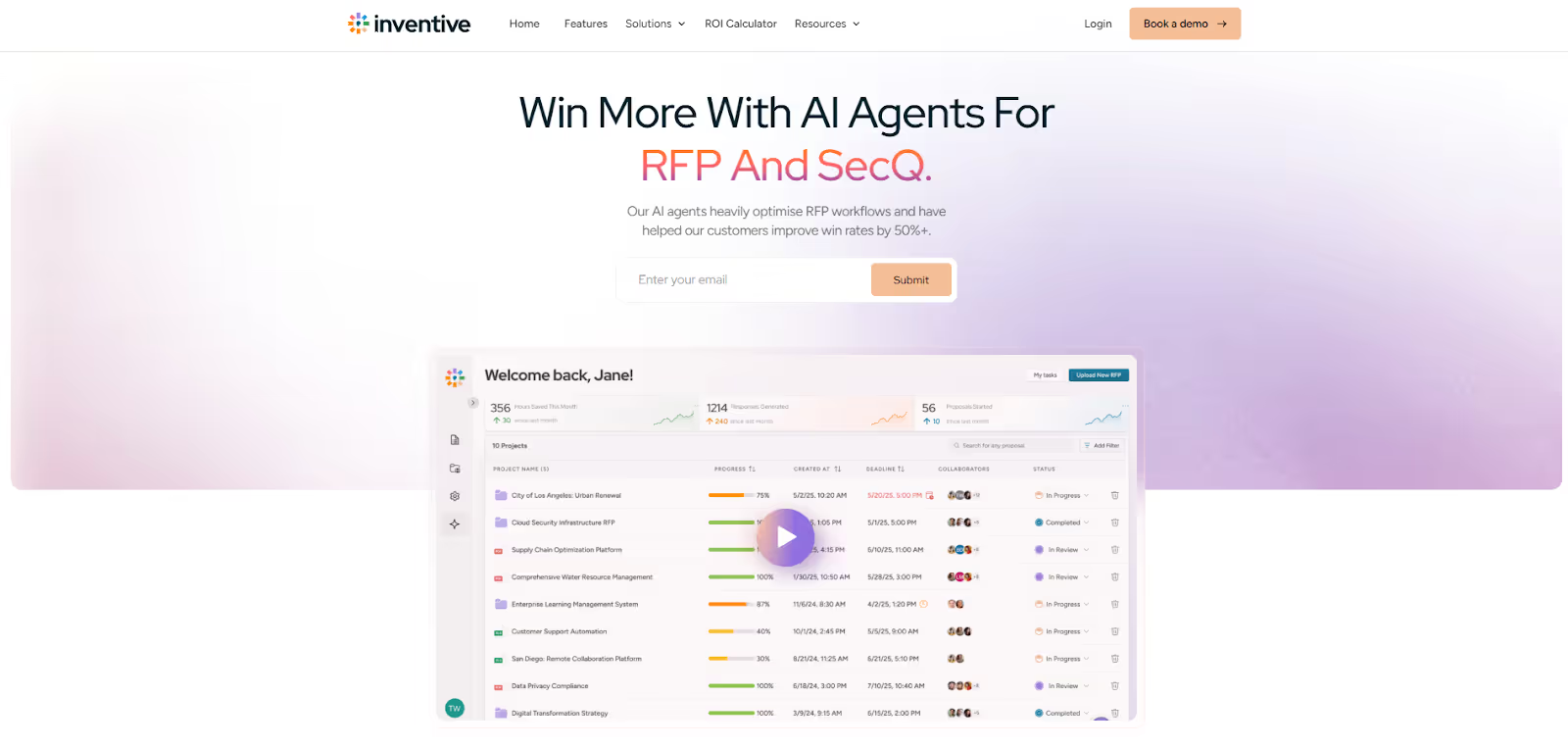
G2 Rating: 5/5
Inventive AI is purpose-built for industries with heavy compliance requirements, making it one of the most effective rfp software for healthcare. Unlike generic RFP software, it is equipped with healthcare-specific features like Win Themes and an AI Content Manager that address regulatory, security, and compliance needs common in payer–provider contracts and hospital procurement.
Key Features:
- AI RFP Agent: Generates accurate first drafts for healthcare RFPs, RFIs, and security questionnaires with 95% accuracy and up to 90% faster turnaround.
- Centralized knowledge hub: Consolidates HIPAA, HITRUST, and regulatory documentation, ensuring no proposal depends on scattered spreadsheets or outdated files.
- AI content management: Proactively flags conflicting compliance data (e.g., mismatched certifications or outdated security policies), reducing audit risks.
- Win Themes for healthcare: Surfaces differentiators by analyzing calls, Slack, and CRM notes to highlight value propositions that resonate with payers and providers.
- Real-time collaboration: Unites compliance, sales, and technical teams in one workspace to ensure responses meet both regulatory and business requirements.
Pros:
- Tailored to compliance-heavy industries like healthcare.
- Conflict detection ensures credibility in security and regulatory answers.
- Proven speed improvements with measurable win-rate increases.
Cons:
- Requires onboarding for teams new to AI-first workflows.
- Broad feature set may overwhelm smaller vendors.
Pricing: Custom pricing based on team size, proposal volume, and features.
Best For: Inventive AI is ideal for Pre-sales Engineers, VPs of Sales, and proposal managers in healthcare who need to balance strict compliance with faster deal execution. It excels in high-stakes RFP environments where accuracy, speed, and compliance readiness directly impact revenue.
Customer Feedback:
"Future of RFP/RFI/Security Questionnaire responses! Saves our team a ton of time. Lots of great features. User experience is extremely intuitive, and the team is very responsive."
— Ben Hou, Head of Solutions, Outreach
Inventive AI Case Study Insider achieved a 50% higher win rate and 90% faster RFP responses by leveraging Inventive AI’s All-Powered RFP Response Software Download the Case Study Now
2. Loopio
.avif)
G2 Rating: 4.7/5
Loopio is one of the most widely adopted RFP platforms and is especially valued in healthcare for its ability to centralize and reuse compliance-heavy proposal content. With healthcare organizations facing hundreds of security and regulatory questions in every RFP, Loopio’s robust content library ensures that teams don’t waste time searching spreadsheets or duplicating outdated answers.
Key Features:
- Robust content libraries: Store HIPAA, HITRUST, and compliance-approved answers in a searchable hub, making response assembly faster and more accurate.
- Content reuse automation: Suggests relevant responses from past healthcare proposals, reducing manual drafting.
- Team collaboration: Supports large healthcare systems where multiple departments (compliance, sales, IT, and legal) need to contribute simultaneously.
- Governance & version control: Keeps content updated and flags expiration dates on certifications or policies.
Pros:
- Proven adoption in healthcare and enterprise environments.
- Strong library management reduces errors and improves consistency.
- Scales effectively for teams managing hundreds of proposals annually.
Cons:
- Requires upfront effort to build and organize libraries.
- Custom pricing may be less accessible for smaller vendors.
Pricing: Custom pricing, typically tailored for mid-sized to large organizations.
Best For: Loopio is ideal for large healthcare systems, insurers, and vendors that handle frequent RFPs and must ensure consistency across compliance-heavy responses. It works best where proposal teams need a centralized, reliable content library that supports collaboration across multiple departments.
User Insights:
Healthcare teams using Loopio report smoother collaboration and significantly reduced time spent tracking down approved compliance language. Many note that proposal quality and consistency improve once content libraries are established.
3. Responsive (formerly RFPIO)
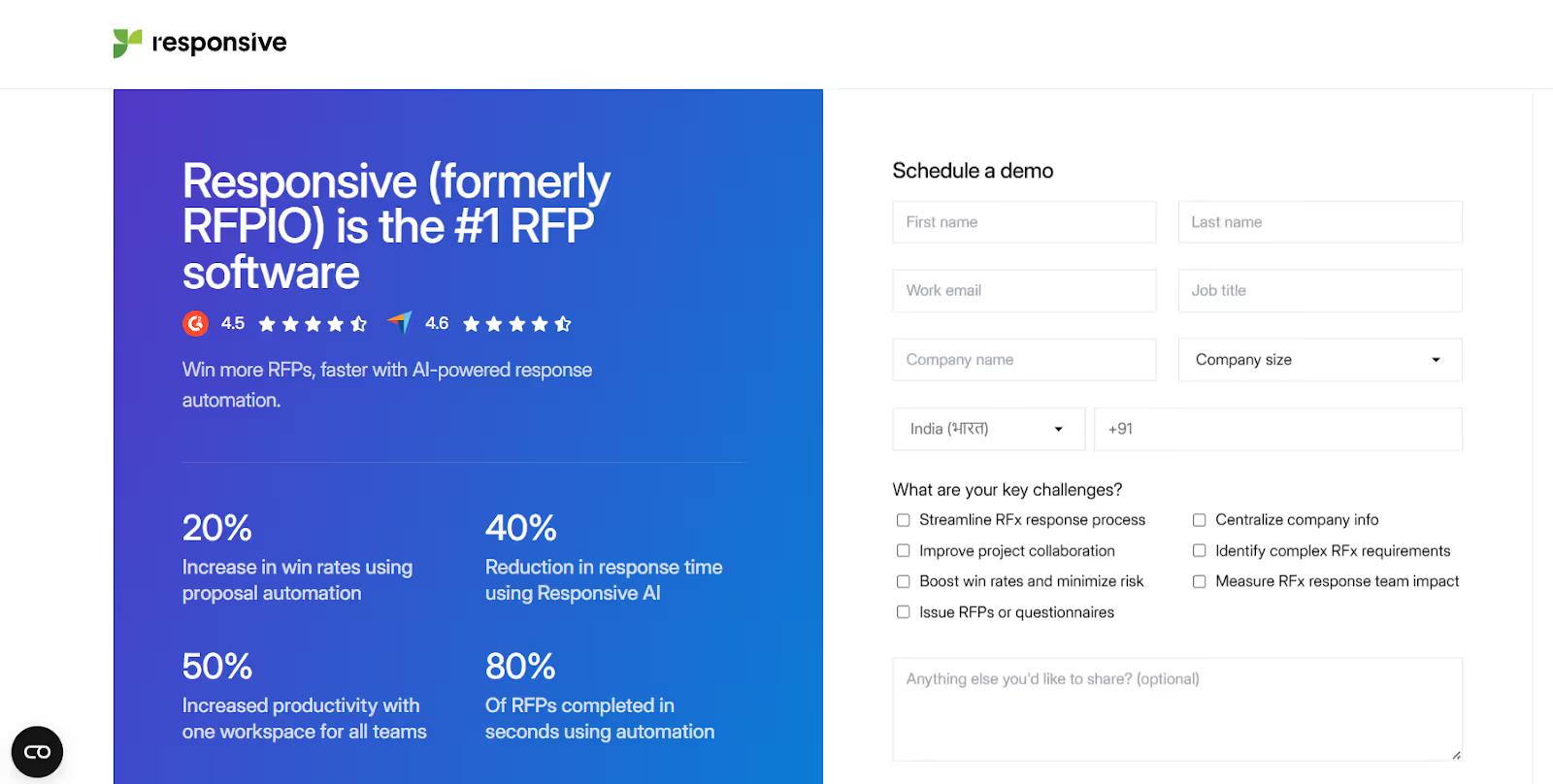
G2 Rating: 4.5/5
Responsive, formerly known as RFPIO, is a collaboration-first RFP management platform widely used by U.S. healthcare providers and insurers. Its strength lies in enabling multi-department collaboration on complex healthcare proposals where compliance, technical, and sales teams must all contribute. By combining AI-driven search with strong workflow oversight, Responsive helps healthcare organizations stay aligned under tight deadlines.
Key Features:
- AI-powered search: Surfaces relevant responses from past proposals, reducing the time spent rewriting compliance-heavy sections.
- Collaboration at scale: Supports simultaneous contributions from compliance officers, IT staff, clinicians, and sales teams.
- Integrations: Connects with Salesforce, Slack, and Microsoft Teams to keep proposal work aligned with existing workflows.
- Analytics dashboards: Tracks progress, deadlines, and team contributions, improving visibility across long healthcare proposal cycles.
Pros:
- Designed for large healthcare organizations with multi-department proposal processes.
- Strong integrations with enterprise tools reduce workflow friction.
- Improves collaboration and transparency across complex RFPs.
Cons:
- Less specialized for healthcare compared to Inventive AI.
- Some users find the interface overwhelming for small teams.
Pricing: Custom pricing based on team size and proposal volume.
Best For: Responsive is best suited for hospitals, insurers, and large healthcare vendors that require multi-department collaboration to complete complex, compliance-heavy proposals. It’s particularly valuable where visibility and cross-team coordination are major pain points.
User Insights:
Healthcare users highlight how Responsive reduces duplication and ensures smoother handoffs between departments. Teams report improved on-time submission rates when using its collaboration workflows.
4. Sifthub
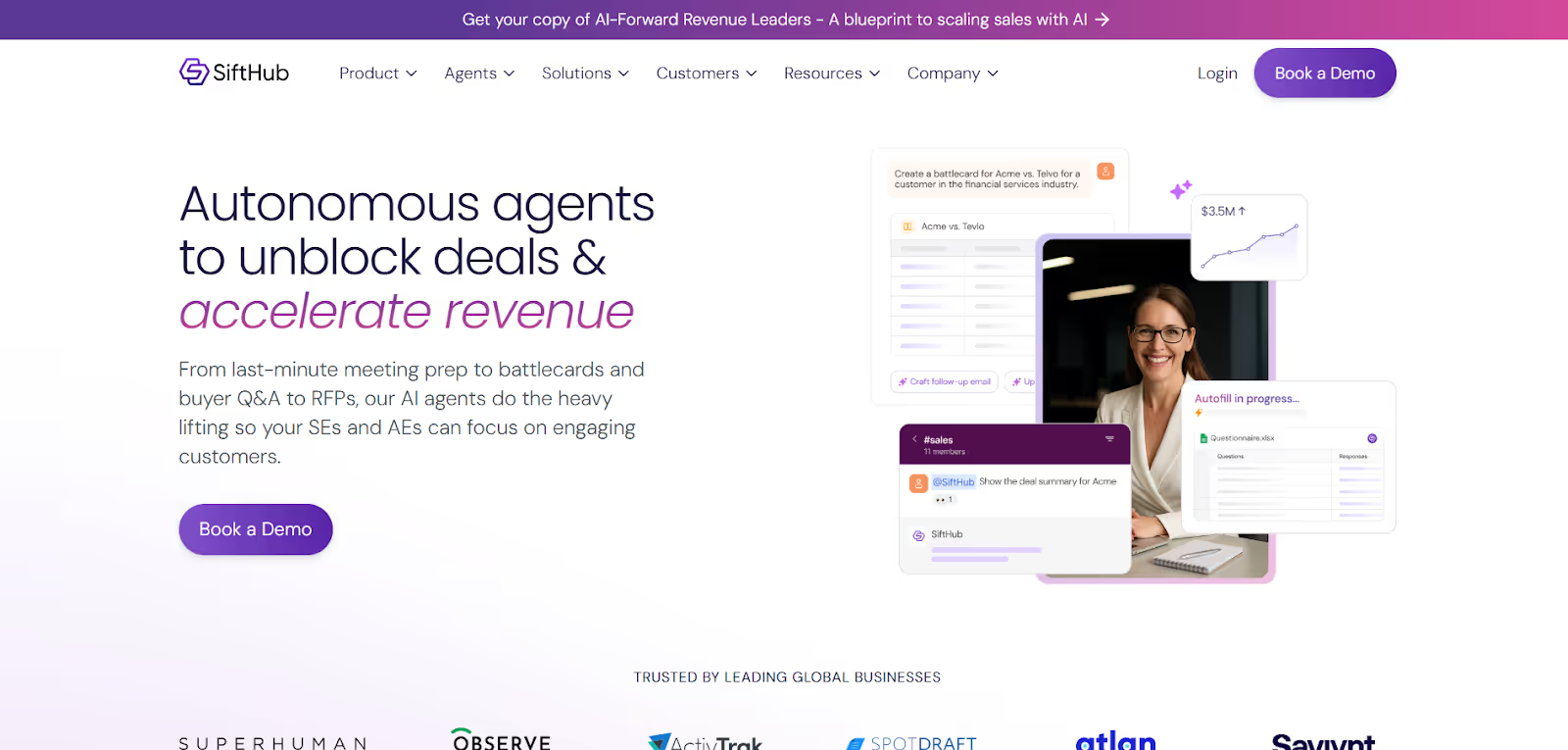
Sifthub is an AI-first proposal platform designed for industries with strict compliance requirements, making it highly relevant for healthcare organizations managing payer–provider contracts and RFPs with complex security questionnaires. Unlike older tools retrofitted with AI, Sifthub was built from the ground up with automation and collaboration at its core.
Key Features:
- AI-first collaboration: Drafts proposal responses automatically, allowing sales, compliance, and IT teams to focus on refinement.
- Compliance-ready workflows: Pre-configured to handle security and regulatory requirements common in healthcare proposals.
- Knowledge centralization: Stores regulatory and policy documents in one hub to eliminate reliance on fragmented spreadsheets and email chains.
- Real-time team alignment: Streamlines contributions across compliance officers, technical experts, and sales leaders in shared workspaces.
Pros:
- Built with AI as the foundation, not an add-on.
- Reduces proposal bottlenecks caused by siloed teams.
- Especially effective for compliance-heavy healthcare submissions.
Cons:
- Smaller user base compared to long-standing legacy tools.
- May require training for teams unfamiliar with AI-driven workflows.
Pricing: Custom pricing, dependent on features and proposal volume.
Best For: Sifthub is best suited for mid-sized to large healthcare vendors, payers, and hospitals seeking a modern AI-native solution that streamlines compliance-heavy proposal creation. It’s a strong fit for organizations frustrated with the limitations of legacy platforms.
User Insights:
Healthcare proposal managers using Sifthub emphasize how it improves cross-team alignment. Many note fewer missed compliance details and faster drafting cycles compared to manual approaches.
5. Arphie
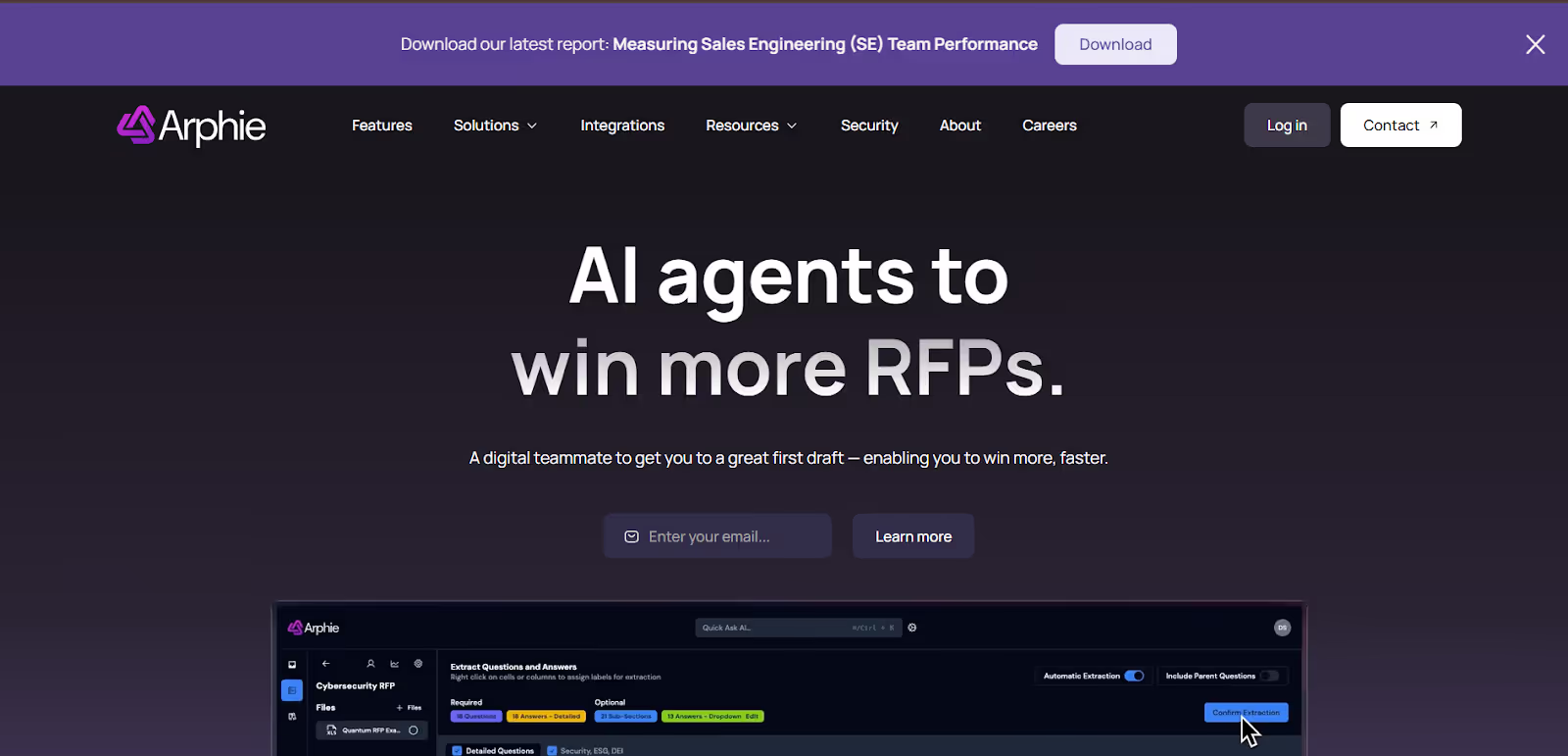
G2 Rating: 4.9/5
Arphie is a lightweight AI-based proposal generator built to accelerate drafting for lean sales teams, making it an attractive option for smaller healthcare vendors and startups. Its primary advantage is speed, producing structured first drafts quickly so teams don’t get bogged down in manual writing.
Key Features:
- AI-based generator: Creates structured, ready-to-edit first drafts for healthcare RFPs and RFIs.
- Lean team focus: Designed for organizations without large dedicated proposal departments.
- Compliance adaptability: Helps incorporate HIPAA and payer-specific requirements into proposals without lengthy manual input.
- Deadline efficiency: Enables smaller teams to stay competitive by meeting tight submission timelines.
Pros:
- Extremely fast draft generation.
- Perfect for lean healthcare sales teams managing compliance-heavy RFPs.
- High user satisfaction for usability and output quality.
Cons:
- Lacks advanced strategic features (like win themes or conflict detection) offered by more mature platforms.
- Best for smaller volumes; may not scale as effectively for enterprise-level proposal teams.
Pricing: Tiered pricing, with flexibility for startups and growing vendors.
Best For: Arphie is ideal for small to mid-sized healthcare vendors that need to deliver professional, compliance-ready proposals quickly without building a large proposal management team.
User Insights:
Healthcare users appreciate Arphie’s simplicity and speed, noting that it makes proposal writing less intimidating for lean sales teams while still delivering compliant drafts.
Also Read: Understanding RFI and RFP in Healthcare Procurement
6. Autorfp ai

Autorfp ai is an AI-driven proposal automation platform designed to reduce the heavy manual effort in drafting and formatting, two of the biggest bottlenecks for healthcare proposal managers. It is especially valuable for payer–provider contracts, where compliance language, structured formatting, and quick turnaround are critical.
Key Features:
- Drafting automation: Generates first drafts of healthcare proposals and questionnaires in minutes, minimizing repetitive writing.
- Formatting support: Ensures proposals are styled, structured, and client-ready, saving managers hours of manual layout work.
- Contract focus: Tailored for payer–provider agreements, ensuring compliance with documentation and policy requirements.
- Collaboration tools: Enables sales, compliance, and technical contributors to edit in a single workspace.
Pros:
- Strong automation for both drafting and formatting.
- High accuracy for compliance-heavy contracts.
- Speeds up turnaround without sacrificing professionalism.
Cons:
- Pricing may be steep for small vendors or startups.
- Less customization flexibility compared to legacy tools.
Pricing: $1,000–$1,450/month depending on features and proposal volume.
Best For: Autorfp ai is best for mid-sized healthcare providers and vendors that need faster turnaround for payer–provider contracts and regulatory-heavy proposals. It’s particularly valuable where formatting compliance and presentation are deal-breakers.
User Insights:
Healthcare proposal managers note significant time savings on formatting tasks and reduced stress on proposal deadlines, making it one of the most user-friendly drafting tools in compliance-heavy contexts.
7. Qvidian (Upland)
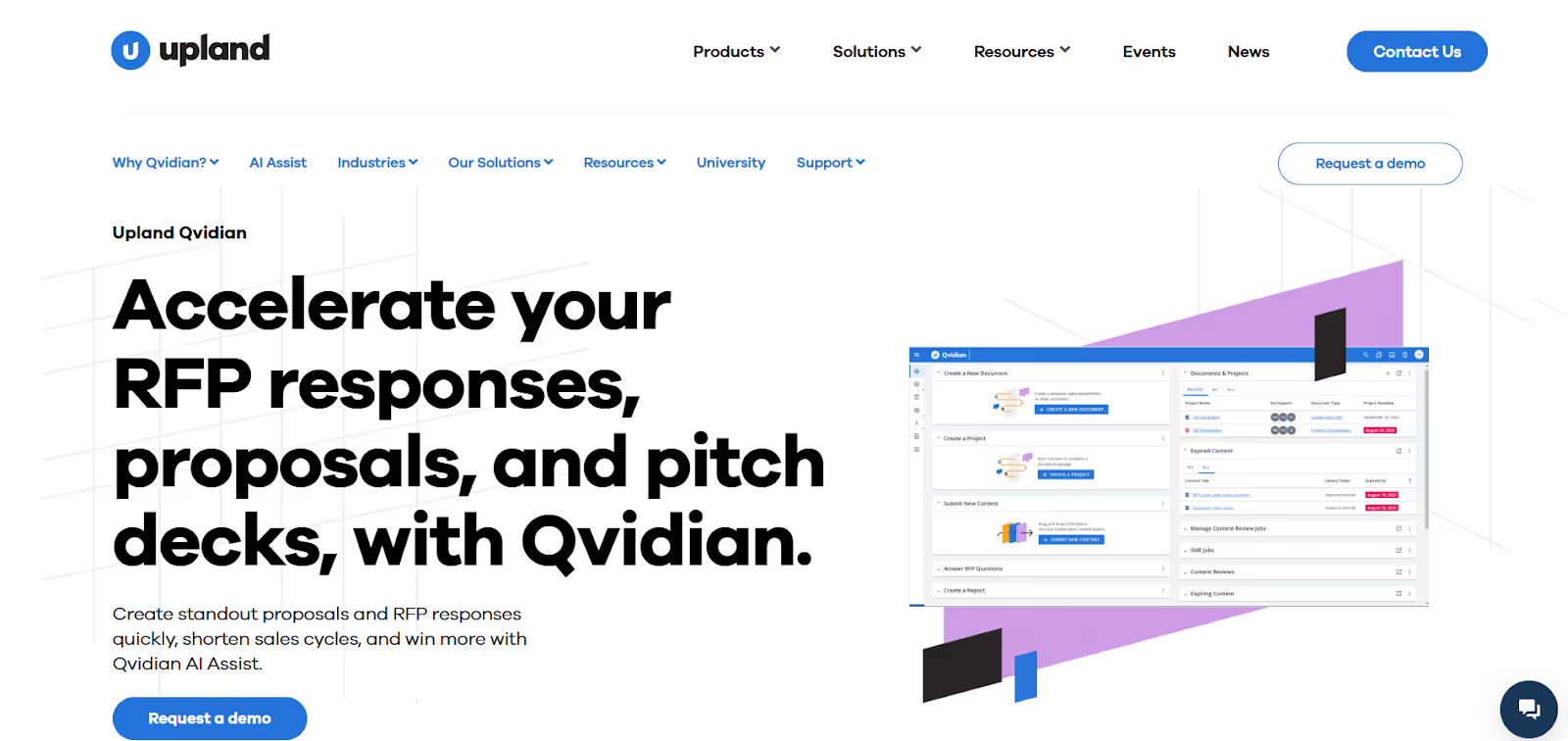
G2 Rating: 4.3/5
Qvidian is a longstanding proposal management solution with over four decades of experience, making it one of the most reliable platforms for healthcare vendors and payers. While it doesn’t have the deep AI-first capabilities of newer entrants, it excels at structured template management and consistency, critical in healthcare proposals where accuracy and regulatory compliance are non-negotiable.
Key Features:
- Template-driven workflows: Standardize responses across HIPAA, HITRUST, and payer contracts using structured templates.
- Content library: Maintain a repository of approved healthcare content, ensuring version-controlled responses.
- CRM integration: Connects with Salesforce to keep proposal activity aligned with sales workflows.
- Audit readiness: Ensures responses follow standardized processes, reducing compliance risks.
Pros:
- Proven reliability with large enterprise and healthcare teams.
- Strong template management for repetitive, compliance-heavy RFPs.
- Familiar interface for organizations used to structured workflows.
Cons:
- Limited AI-driven features compared to newer platforms.
- Less flexible for fast-changing healthcare compliance needs.
Pricing: Custom pricing tailored for enterprise adoption.
Best For: Qvidian is ideal for large healthcare organizations, insurers, and established vendors that prioritize reliability and standardization over advanced AI features. It’s a good fit for teams that want predictable processes and template-driven accuracy.
User Insights:
Healthcare proposal teams highlight Qvidian’s stability and predictability. Many use it as a foundational tool, though some note they supplement it with newer AI solutions to gain speed and flexibility.
8. XaitPorter
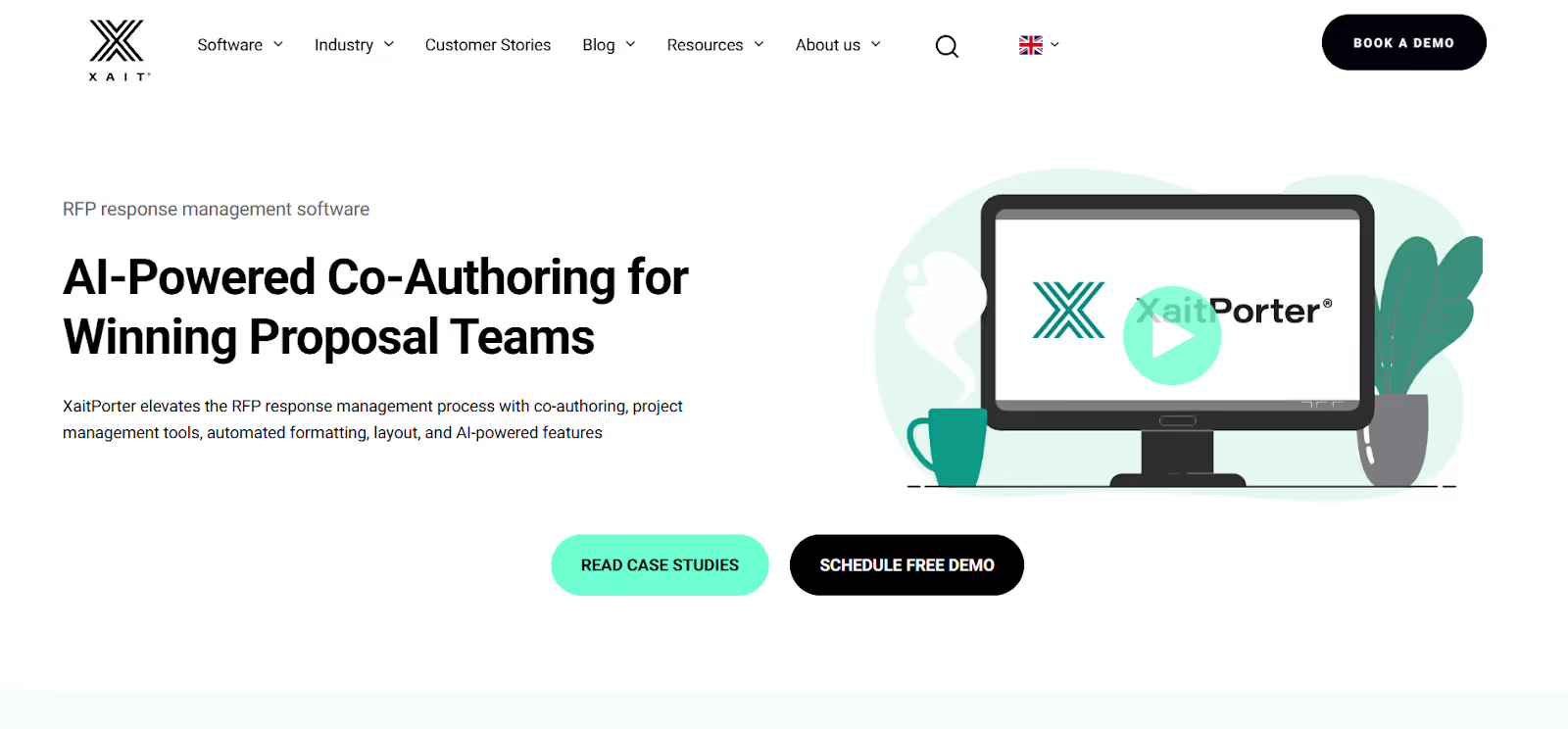
G2 Rating: 4.6/5
XaitPorter is a collaboration-focused proposal platform that excels in compliance-heavy industries like healthcare, where multiple stakeholders must contribute to a single RFP response. It’s built around structured co-authoring, ensuring that sales, compliance, IT, and legal teams can work on proposals simultaneously without duplication or version conflicts.
Key Features:
- Structured co-authoring: Multiple contributors can edit and refine proposals in real time, preventing version control issues.
- Compliance tracking: Designed to support regulated industries, ensuring proposals meet healthcare standards such as HIPAA and HITRUST.
- Task management: Assigns and monitors contributions across departments, keeping complex RFPs on schedule.
- Audit-ready processes: Builds transparency into workflows, reducing compliance risks during payer or regulatory reviews.
Pros:
- Excellent for multi-department collaboration in healthcare.
- Strong compliance oversight features.
- Eliminates version-control issues that often slow down healthcare proposals.
Cons:
- Less AI-driven automation compared to newer entrants.
- Requires process alignment to get full value.
Pricing: Custom pricing, often suited for mid-to-large enterprises.
Best For: XaitPorter is best for hospitals, payers, and healthcare vendors managing large, multi-stakeholder RFPs. It works especially well when proposals involve input from compliance officers, technical teams, and legal departments simultaneously.
User Insights:
Healthcare users praise XaitPorter’s collaboration model, noting smoother coordination across departments and fewer delays caused by scattered review cycles.
9. RocketDocs
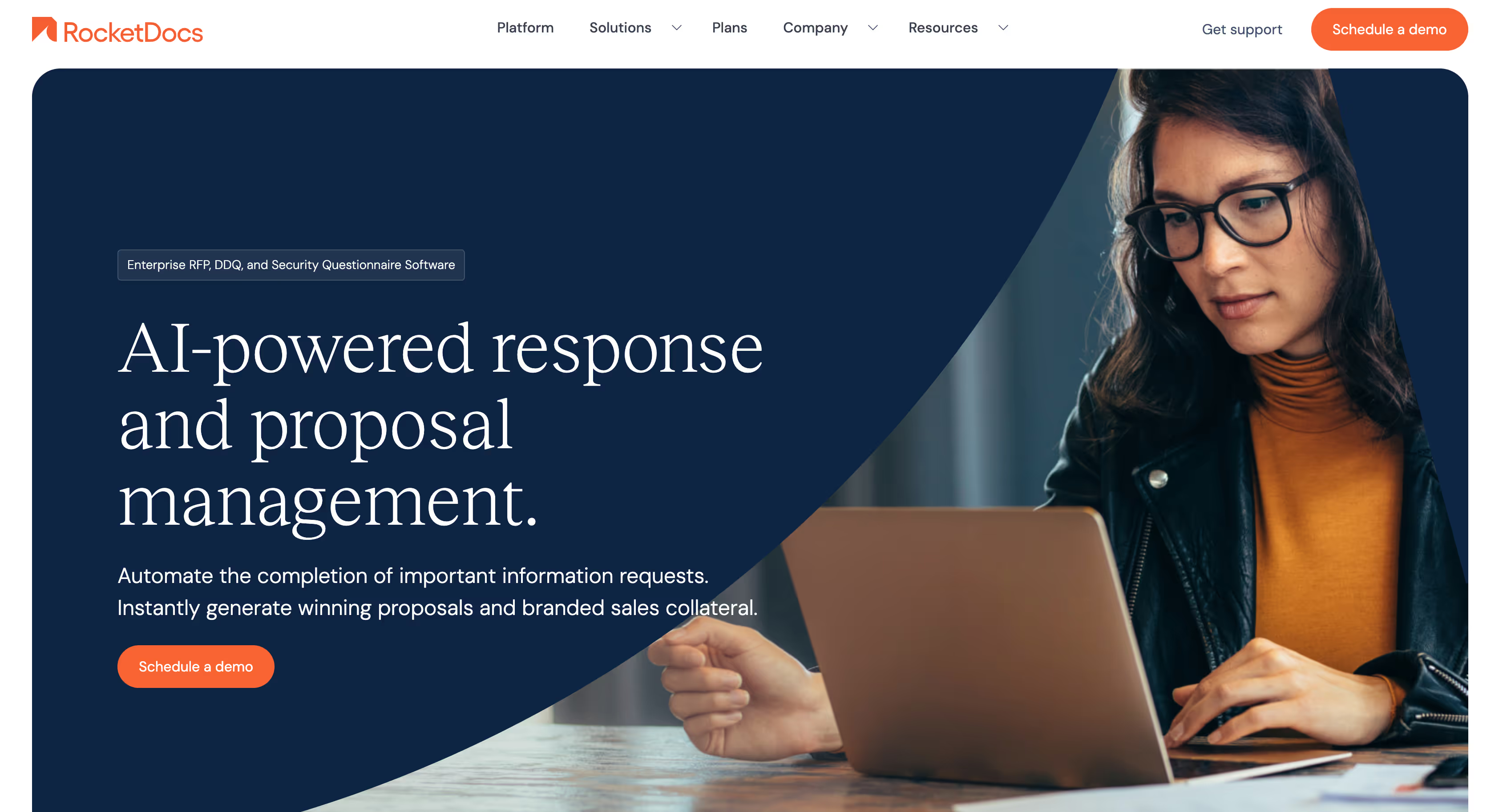
G2 Rating: 4.2/5
RocketDocs is a secure proposal management platform designed with privacy and compliance at its core, making it particularly relevant for healthcare organizations handling sensitive patient data, payer contracts, and compliance-heavy RFPs. Its emphasis on private AI ensures data security while still providing automation and efficiency gains.
Key Features:
- Private AI: Keeps sensitive healthcare and patient-related information secure while automating proposal drafting.
- Content hub: Stores approved responses, certifications, and compliance documents in a centralized repository.
- Collaboration tools: Enables healthcare compliance, IT, and sales teams to refine responses together.
- Integration support: Works with CRM and document systems to reduce workflow duplication.
Pros:
- Secure, privacy-first AI design; essential for healthcare vendors handling sensitive data.
- Streamlines compliance-heavy proposals with central documentation.
- Reduces risk of exposing confidential healthcare information to public AI models.
Cons:
- Lower G2 rating than some competitors, reflecting limitations in advanced features.
- User interface may feel dated compared to newer AI-native platforms.
Pricing: Custom pricing, tailored to enterprise security and compliance needs.
Best For: RocketDocs is ideal for healthcare providers, payers, and vendors that need data security assurance while automating proposals. It’s a good fit for organizations prioritizing privacy and compliance above speed alone.
User Insights:
Healthcare teams value RocketDocs for its security-first approach, noting confidence in handling proposals with highly sensitive compliance data.
10. QorusDocs
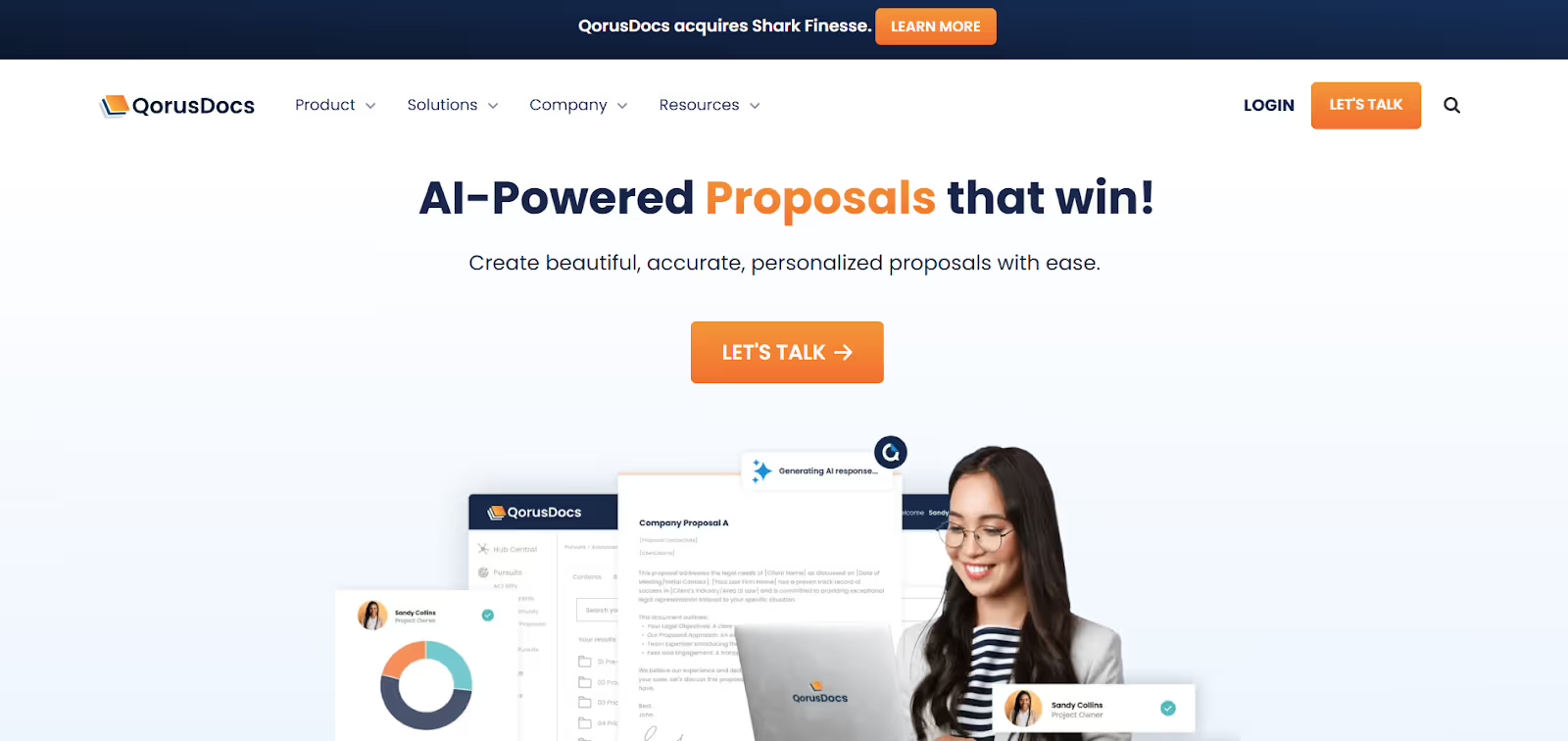
G2 Rating: 4.4/5
QorusDocs is a Microsoft Office–integrated proposal solution that simplifies RFP workflows for healthcare teams already using Word, PowerPoint, and Outlook. By embedding directly into familiar tools, it reduces training requirements and makes proposal automation accessible to compliance, sales, and technical staff who may not be used to dedicated RFP platforms.
Key Features:
- Microsoft Office integration: Draft, edit, and finalize healthcare RFPs directly within Word and PowerPoint.
- Smart content suggestions: Surfaces compliance-approved answers and templates while drafting.
- Collaboration support: Teams can co-author documents within Office apps, ensuring smoother review cycles.
- Content management: Stores and organizes healthcare-specific responses for easy reuse across multiple proposals.
Pros:
- Easy adoption due to Microsoft Office integration.
- Reduces friction for cross-functional healthcare teams.
- Helpful for quick content reuse and consistency.
Cons:
- Less advanced AI than platforms built natively for proposal automation.
- Limited scalability for very large, compliance-heavy healthcare RFP volumes.
Pricing: Custom pricing, depending on team size and integration needs.
Best For: QorusDocs is best suited for healthcare vendors, hospitals, and payers who want a low-learning-curve tool embedded in Office workflows. It’s especially useful for organizations where staff already rely heavily on Microsoft tools.
User Insights:
Healthcare users find QorusDocs approachable and efficient for simplifying proposal drafting without major workflow changes. Teams highlight faster adoption due to its seamless Microsoft ecosystem integration.
11. PandaDoc

G2 Rating: 4.7/5
PandaDoc is a document automation platform that combines proposals, contracts, and e-signatures in a single system. In healthcare, it’s especially valuable for organizations that need to manage both proposals and compliance-heavy agreements while maintaining HIPAA or payer documentation standards. Its simplicity and versatility make it a favorite for mid-sized healthcare vendors.
Key Features:
- Unified platform: Handles proposals, contracts, and e-signatures in one place, reducing the need for multiple tools.
- Healthcare adoption: Frequently used for payer–provider agreements where secure documentation and fast approval are critical.
- E-signature compliance: Ensures documents meet legal and regulatory requirements for healthcare contracts.
- Template library: Offers customizable templates that reduce repetitive formatting work.
Pros:
- Easy to use with minimal onboarding.
- Combines proposals and contract workflows for faster deal closure.
- Strong healthcare adoption for agreements requiring compliance approval.
Cons:
- Not as feature-rich for deep RFP automation compared to AI-first platforms.
- Larger enterprises may find it less robust for very complex proposals.
Pricing: $19–$65/user/month depending on plan.
Best For: PandaDoc is ideal for healthcare vendors, mid-sized providers, and payers that want to streamline both proposal and contract workflows. It’s best for teams that value simplicity, fast adoption, and integrated contract management.
User Insights:
Healthcare teams highlight PandaDoc’s ease of use and ability to reduce delays in contracting after proposals are submitted, making it an efficiency booster across the sales cycle.
12. Proposify
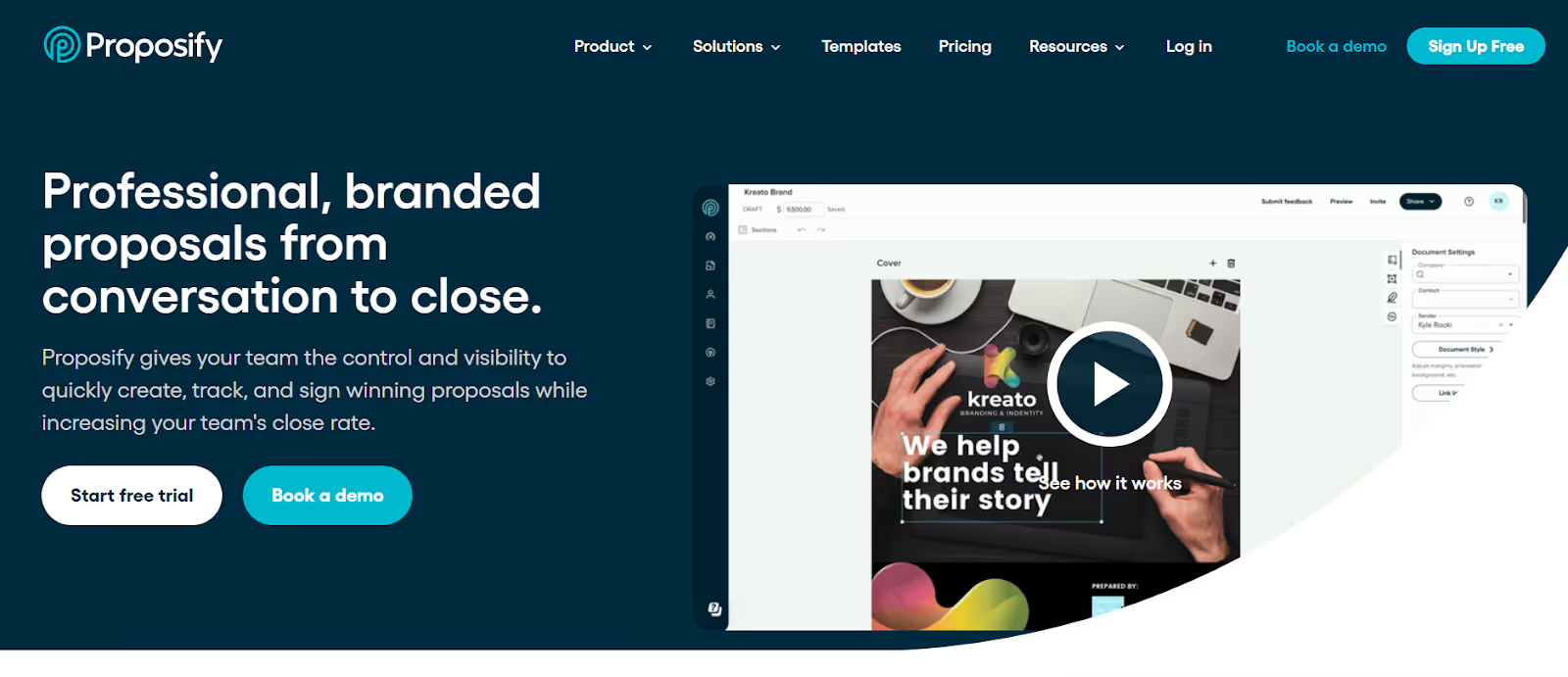
G2 Rating: 4.6/5
Proposify is a proposal design and automation platform that helps healthcare vendors create professional, client-ready proposals quickly. While not as compliance-heavy as other tools, it shines in presentation quality and ease of use: making it especially useful when healthcare vendors want to stand out with clear, polished submissions.
Key Features:
- Customizable templates: Tailor templates for healthcare RFPs and sales proposals without extensive formatting work.
- AI-assisted formatting: Automates layout adjustments for consistency and professional design.
- Team collaboration: Enables sales and compliance staff to edit and review in one platform.
- Content library: Stores reusable responses for healthcare-specific sections, ensuring accuracy and efficiency.
Pros:
- Strong focus on design and proposal presentation.
- Reduces repetitive formatting tasks.
- Easy to adopt for smaller and mid-sized healthcare teams.
Cons:
- Limited compliance management features compared to healthcare-focused platforms.
- May not scale as well for large, complex healthcare RFPs.
Pricing: $19–$65/user/month.
Best For: Proposify is best for small to mid-sized healthcare vendors that want to improve the visual impact of proposals while saving time on formatting. It works well where proposal design plays a role in client perception.
User Insights:
Healthcare users note that Proposify makes proposals look polished and professional with minimal effort. Many appreciate how it simplifies formatting so teams can focus on content accuracy.
13. GetAccept
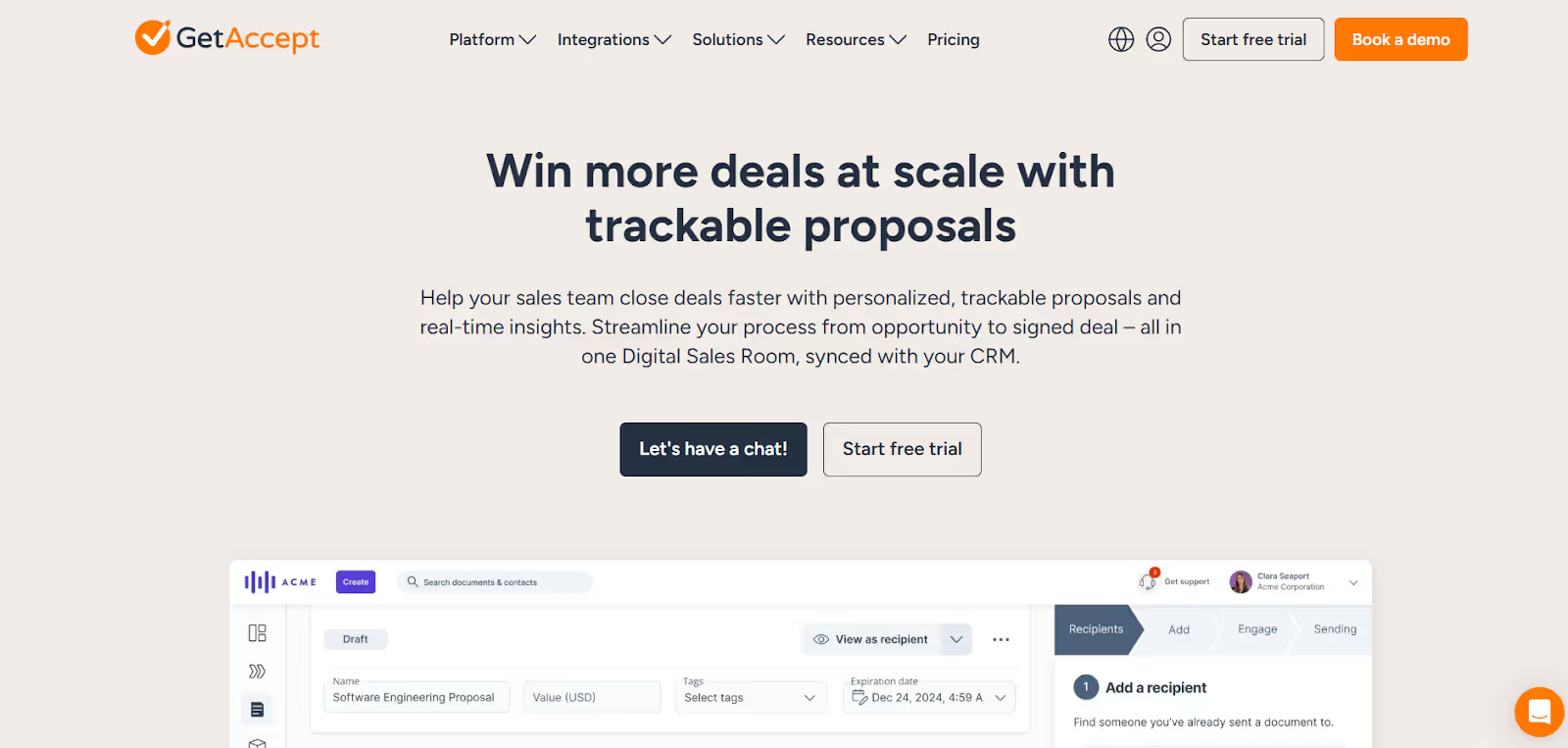
G2 Rating: 4.6/5
GetAccept is a proposal and sales enablement platform that combines proposal automation with buyer engagement insights. For healthcare vendors and payers, it’s particularly valuable because it not only supports proposal creation but also helps sales teams track how buyers interact with submitted documents, giving visibility into what resonates most in complex healthcare negotiations.
Key Features:
- Proposal + enablement: Manages proposal creation alongside sales engagement features in one system.
- Engagement tracking: Tracks how payers, providers, or procurement teams review proposals, including time spent on specific sections.
- CRM integration: Connects with Salesforce and HubSpot to align proposal activity with sales pipelines.
- E-signature support: Accelerates deal closure with secure, compliant signing workflows.
Pros:
- Combines proposal management and buyer intelligence.
- Provides actionable insights into how healthcare buyers engage with proposals.
- Streamlines the full journey from proposal to contract.
Cons:
- Not as specialized for healthcare compliance as platforms like Inventive AI.
- May include more sales-focused features than smaller healthcare teams need.
Pricing: Custom pricing based on team size and features.
Best For: GetAccept is ideal for healthcare vendors, payers, and solution providers who want both proposal automation and buyer engagement insights to improve deal conversion. It’s especially useful in competitive payer–provider contract negotiations.
User Insights:
Healthcare teams value GetAccept’s engagement tracking, noting it helps them prioritize follow-ups and tailor conversations based on buyer behavior.
14. Better Proposals
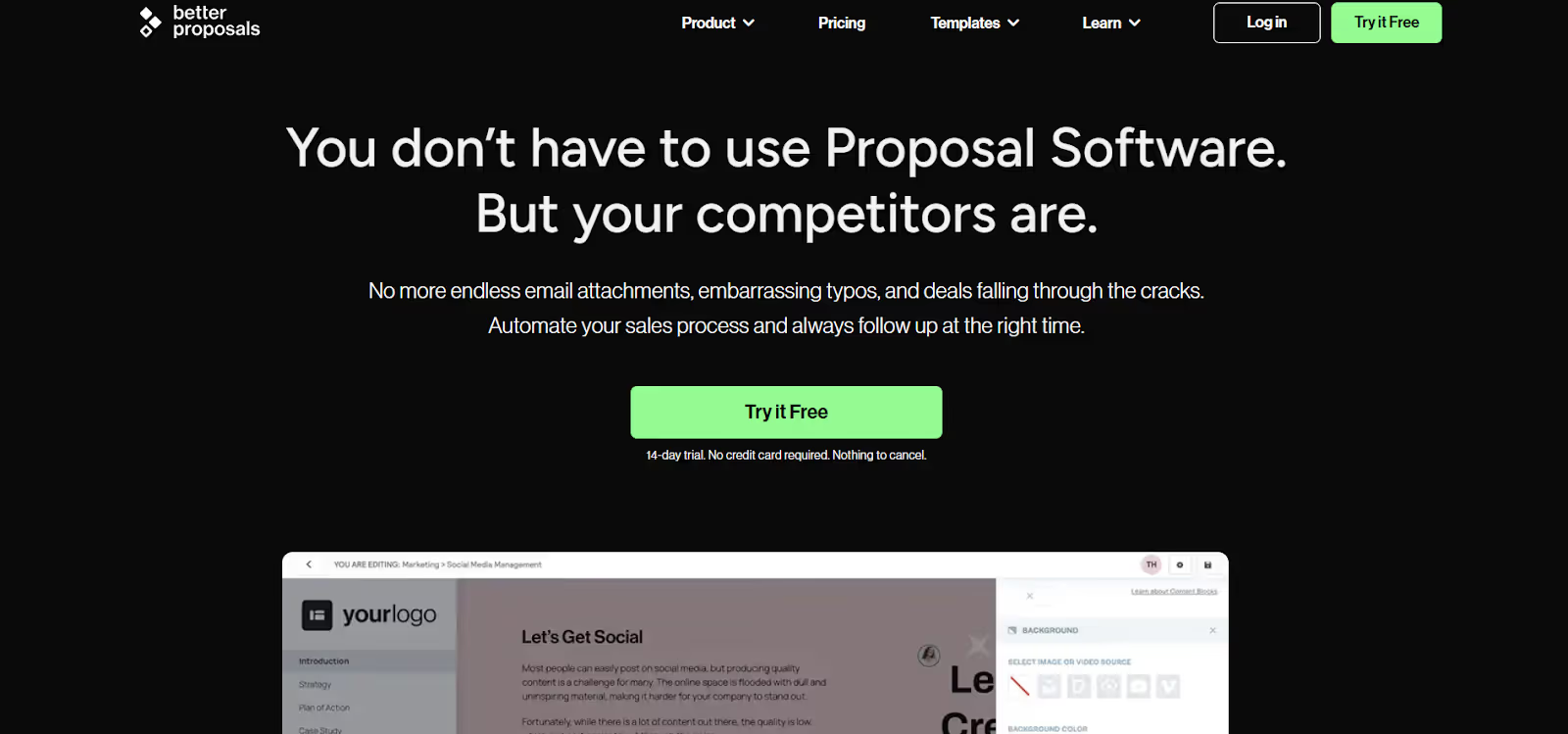
G2 Rating: 4.3/5
Better Proposals is a simple, template-driven proposal tool designed for smaller organizations, including healthcare startups and lean vendors. Its strength lies in accessibility; providing easy-to-use AI templates that help small teams quickly produce professional, compliance-ready documents without needing a large proposal department.
Key Features:
- AI-powered templates: Prebuilt formats for healthcare RFPs and sales proposals that can be customized in minutes.
- Affordable pricing: Makes proposal automation accessible for smaller vendors.
- E-signature support: Built-in digital signing accelerates approvals.
- Tracking insights: Provides basic analytics on when proposals are opened and reviewed.
Pros:
- Very easy to adopt, with minimal setup.
- Affordable compared to enterprise-grade proposal tools.
- Suitable for smaller healthcare vendors needing quick, compliant responses.
Cons:
- Lacks advanced compliance management or conflict detection features.
- Not designed for large-scale healthcare proposal volumes.
Pricing: $19–$29/user/month.
Best For: Better Proposals is ideal for small healthcare vendors, startups, and niche providers that need simple, professional proposals quickly while staying within budget.
User Insights:
Healthcare teams using Better Proposals appreciate its simplicity and affordability, especially for RFPs that don’t require deep compliance management.
15. BidSketch
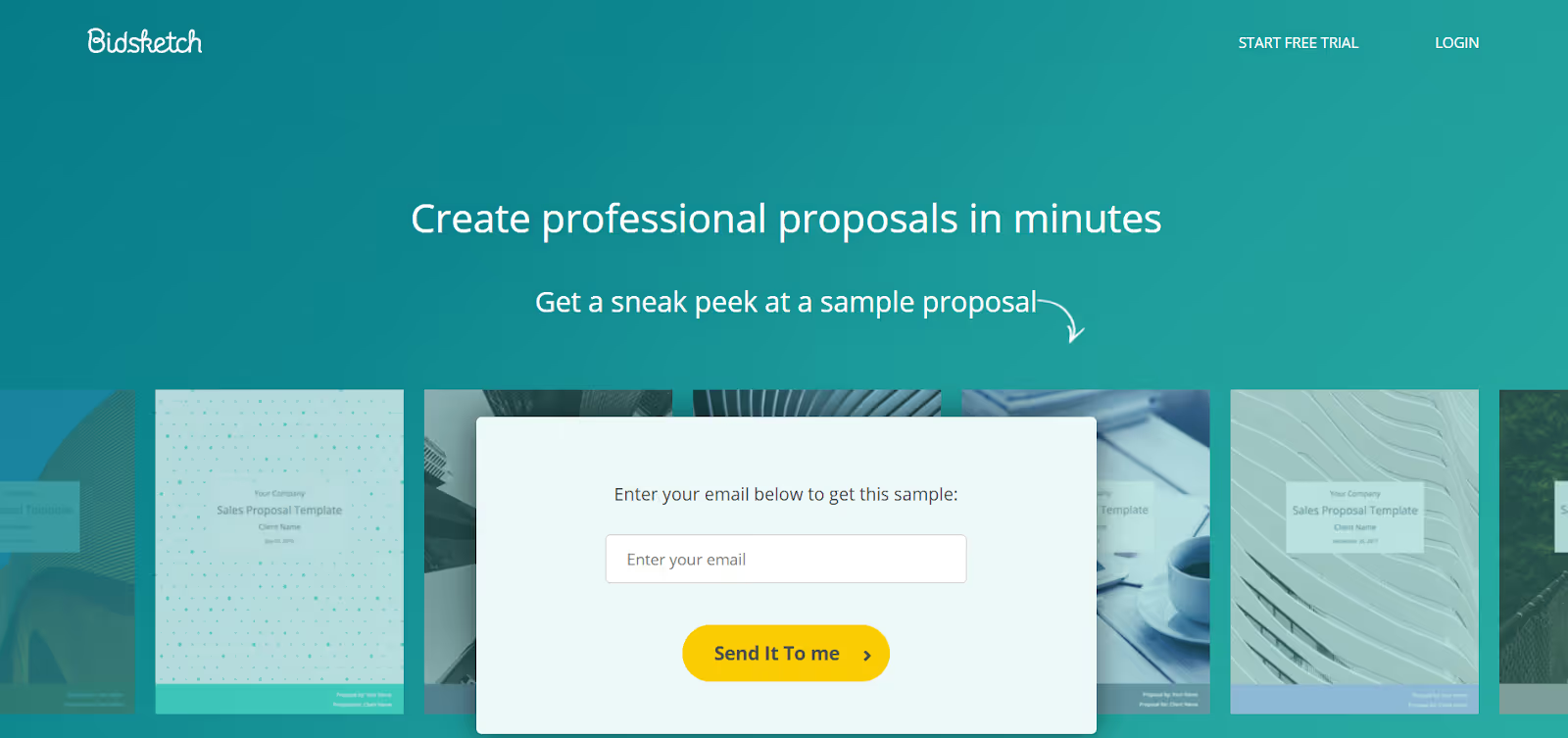
G2 Rating: 3.6/5
BidSketch is a budget-friendly proposal tool designed for consultants and small vendors, including those in healthcare. While not as advanced as AI-first platforms, it provides affordable templates and structured proposal formatting, making it a solid entry-level option for small healthcare organizations managing simpler RFPs.
Key Features:
- Structured proposals: Ensures proposals follow a clean, professional format suitable for healthcare buyers.
- Template library: Offers AI-assisted templates that reduce manual formatting effort.
- Cost efficiency: Provides a low-cost alternative for vendors with limited proposal budgets.
- Basic analytics: Tracks when proposals are opened and viewed.
Pros:
- Affordable option for small healthcare vendors and consultants.
- Easy to set up and use without steep learning curves.
- Helps maintain professional structure and consistency.
Cons:
- Lower G2 rating compared to peers, reflecting limited features.
- Lacks deep AI automation or compliance oversight for complex healthcare proposals.
- Not ideal for large-scale or compliance-heavy RFP cycles.
Pricing: $29–$149/month depending on plan.
Best For: BidSketch is best for consultants, small healthcare vendors, and niche providers who need a low-cost tool to present structured, professional proposals but don’t require advanced AI features.
User Insights:
Healthcare users see BidSketch as a budget-friendly starting point. While basic, it provides enough structure to ensure proposals look professional without heavy investment.
Also Read: Top RFP Software Features That Maximize ROI
How AI Improves the Healthcare Proposal Process?
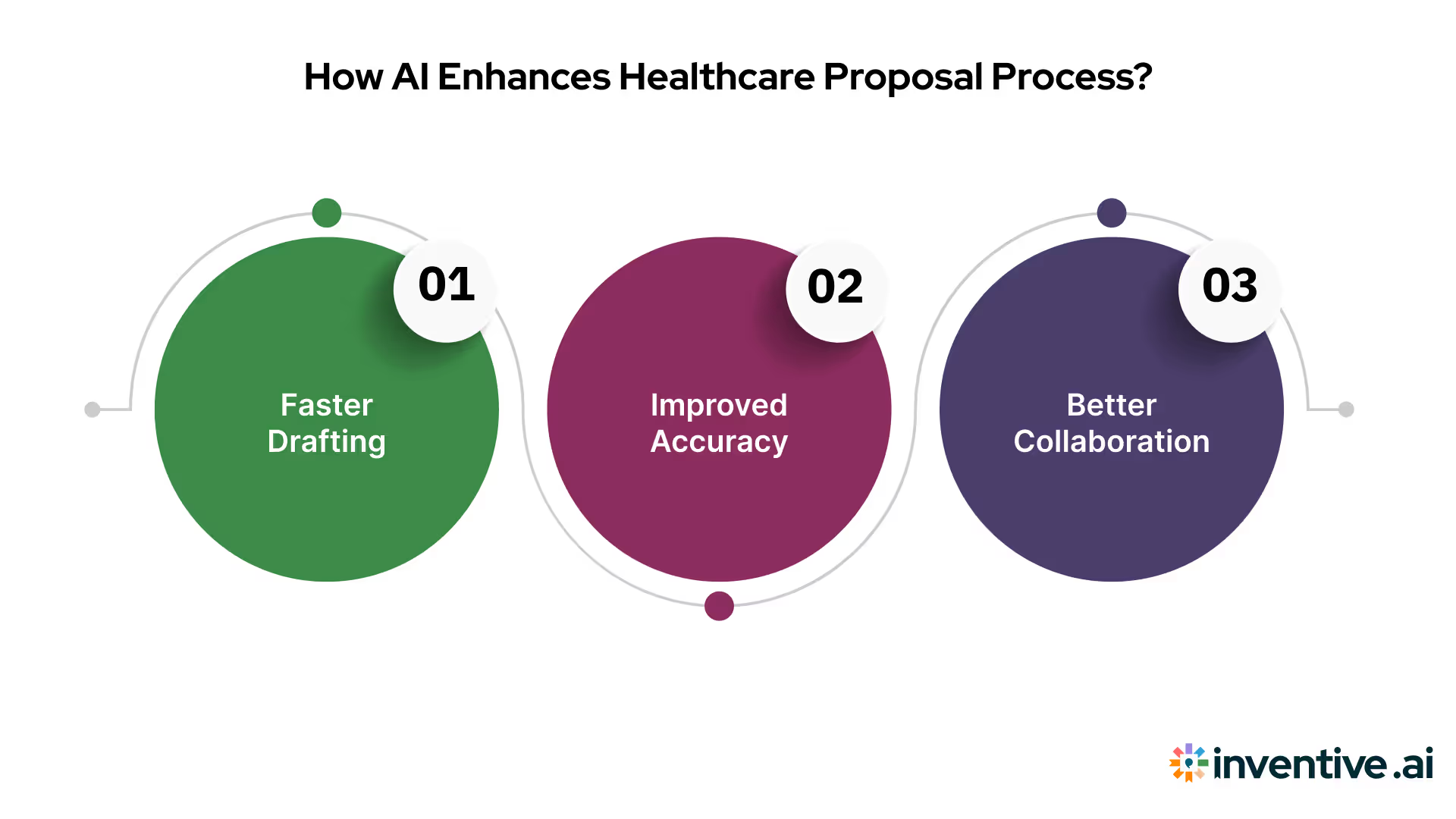
Artificial intelligence is changing how healthcare organisations manage proposals. By automating repetitive work and centralising knowledge, AI enables proposal teams to deliver faster, more accurate responses. For CROs and VPs of Sales, this translates into stronger throughput and fewer missed opportunities caused by errors or delays.
Key benefits of AI in healthcare proposals include:
- Faster drafting: AI generates first drafts quickly, reducing hours of manual writing and formatting.
- Improved accuracy: Proposals align more closely with healthcare compliance requirements by drawing on structured and verified content.
- Better collaboration: Sales, compliance, and technical teams can contribute seamlessly within shared AI-enabled platforms.
A recent HIMSS survey found that nearly 80 percent of US healthcare organisations plan to increase AI investment to improve operational efficiency, including procurement and proposal processes. This trend highlights the industry’s recognition that manual proposal workflows are no longer sustainable.
Consider a hospital responding to an RFP from a major payer. Without AI, the team spends weeks chasing compliance documents, technical details, and financial inputs. With AI, relevant past responses appear instantly, first drafts are generated automatically, and reviews are streamlined across departments. The result is a complete, compliant proposal delivered in days rather than weeks.
AI is no longer a nice-to-have but a necessity for healthcare teams that need to manage heavy proposal volumes and maintain accuracy under tight deadlines.
Choosing the Best Healthcare Proposal Content AI for Your Team
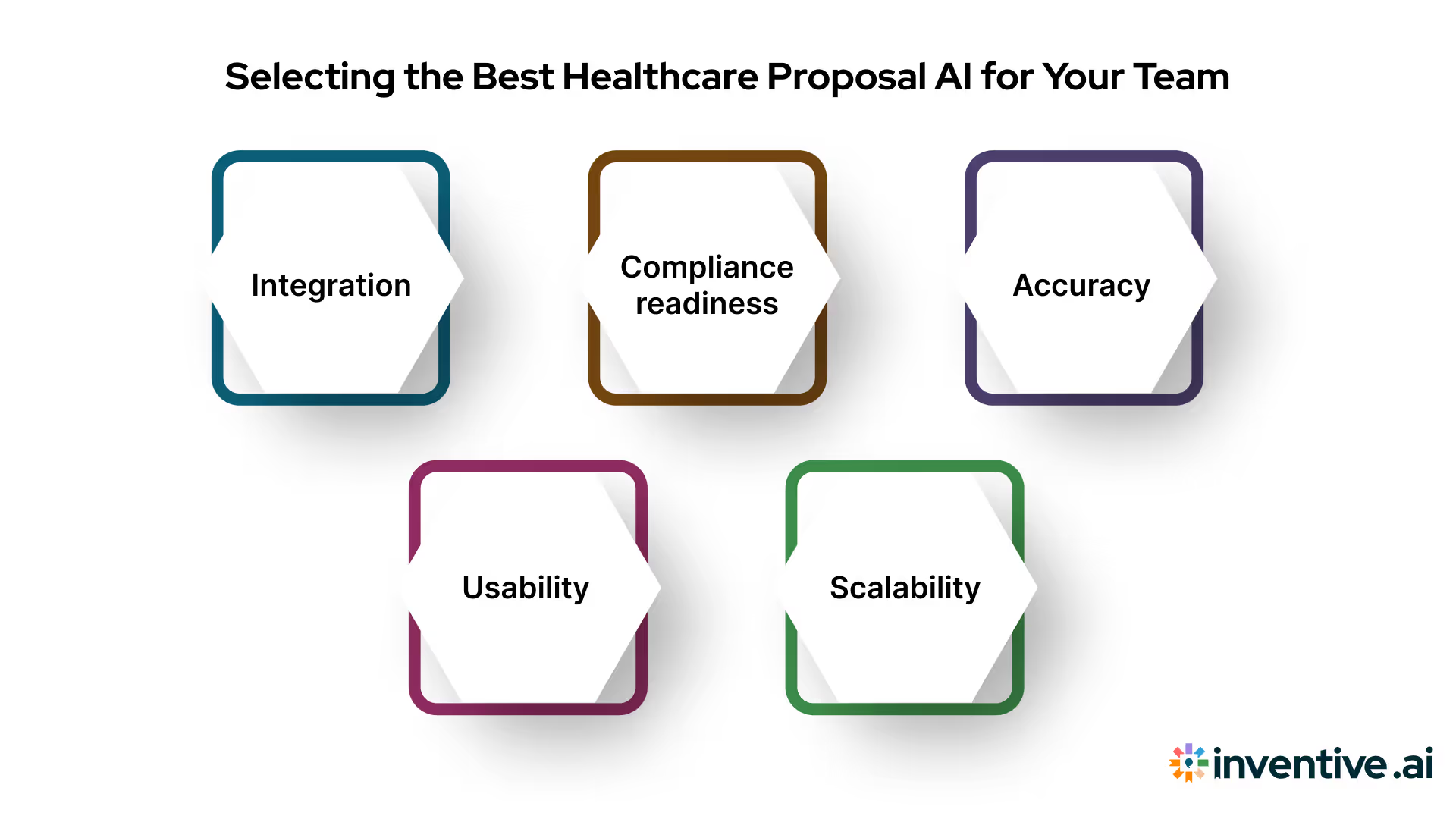
Selecting the right AI solution requires a clear focus on practical needs. Healthcare proposals demand accuracy, compliance alignment, and the ability to manage large volumes of content efficiently. For CROs, VPs of Sales, and Proposal Managers, the decision must balance both immediate benefits and long-term scalability.
Key factors to consider include:
- Integration: The AI tool should connect with existing systems such as Salesforce, SharePoint, or Slack to reduce duplication and improve workflow efficiency.
- Compliance readiness: Ensure the solution supports healthcare-specific requirements like HIPAA, HITRUST, and security questionnaires.
- Accuracy: Look for AI platforms that consistently generate precise drafts without relying on outdated or conflicting content.
- Usability: Teams across sales, compliance, and technical roles should find the platform easy to use without steep learning curves.
- Scalability: As proposal volumes grow, the tool must handle increasing workloads without slowing down or requiring large new investments.
Choosing the right platform is ultimately about ensuring your proposal teams can deliver accurate, compliant, and timely responses without being overwhelmed by manual tasks. Which AI meets healthcare’s unique demands?
Conclusion
Healthcare proposals remain one of the most demanding areas for sales and proposal teams, with compliance-heavy requirements, long turnaround times, and scattered content slowing progress. The best healthcare proposal content AI addresses these challenges by delivering faster drafts, ensuring accuracy, and simplifying collaboration, making it essential for healthcare vendors competing in high-stakes deals.
Inventive AI builds on these advantages with its AI RFP Agent, centralised knowledge hub, AI Content Manager, and Win Themes. By offering 95 percent accuracy, 90 percent faster drafting, and up to 50 percent higher win rates, it ensures healthcare teams achieve measurable results while staying compliant and consistent.
How much revenue could your healthcare team capture if proposal times dropped by 90 percent? The time to transform healthcare RFP responses with AI is now! and Inventive AI is the partner designed to help you win more.
What Customers Say About Inventive AI:
“Thank you for building this tool. I am so pumped. Overall, my RFP workflow is SO much faster now with Inventive. My day was a lot less stressful using Inventive.”
— Anthony Pukal, Solutions Consultant, Insider
“Future of RFP/RFI/Security Questionnaire responses! Saves our team a ton of time. Lots of great features. User experience is extremely intuitive, and the team is very responsive.”
— Ben Hou, Head of Solutions, Outreach
FAQs
Q: How does AI reduce the time healthcare teams spend on complex security questionnaires in RFPs?
A: AI platforms store previous questionnaire responses in a central library, making them instantly reusable. They flag outdated answers automatically, ensuring compliance. Teams spend less time rewriting repetitive answers, focusing instead on refinement. This improves response accuracy and saves healthcare vendors significant preparation hours.
Q: Can smaller healthcare vendors with lean sales teams benefit from AI proposal tools?
A: Yes, AI tools help smaller vendors by generating accurate first drafts. These drafts minimize manual effort required from limited teams. Affordable platforms like Zbizlink or Better Proposals provide templates suited for healthcare. Smaller vendors remain competitive while maintaining professional, compliance-ready responses.
Q: How does AI ensure proposals remain aligned with strict healthcare compliance requirements?
A: AI content managers identify and remove stale or conflicting content in knowledge hubs. They highlight compliance-sensitive areas requiring updated documentation. Proposal teams can quickly adapt responses based on regulatory shifts. This ensures every submission remains consistent with healthcare standards like HIPAA or HITRUST.
Q: What role does AI play in improving collaboration across healthcare sales, compliance, and technical teams?
A: AI-enabled platforms integrate with tools like Slack, Teams, and Salesforce. They allow seamless sharing of proposal drafts across departments. Updates and reviews occur in real time, reducing delays. This streamlines collaboration, ensuring proposals are cohesive and compliant before submission.
Q: How do healthcare organisations measure success after adopting AI for proposal management?
A: Success is tracked through faster response times, improved accuracy, and higher win rates. Metrics like reduced turnaround hours reflect efficiency gains. Proposal managers often see increased consistency across documents. Over time, revenue teams close deals faster and capture more opportunities.

90% Faster RFPs. 50% More Wins. Watch a 2-Minute Demo.
Recognizing that complex RFPs demand deep technical context rather than just simple keyword matching, Vishakh co-founded Inventive AI to build a smarter, safer "RFP brain." A published author and researcher in deep learning from Stanford, he applies rigorous engineering standards to ensure that every automated response is not only instant but factually accurate and secure.
Tired of watching deal cycles stall due to manual questionnaire back-and-forth, Dhiren co-founded Inventive AI to turn the RFP process from a bottleneck into a revenue accelerator. With a track record of scaling enterprise startups to successful acquisition, he combines strategic sales experience with AI innovation to help revenue teams close deals 10x faster.


